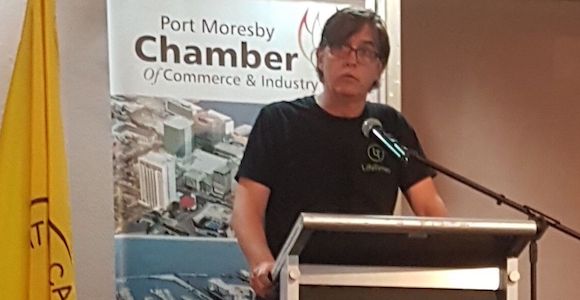Peter Williams, Chief Executive of Deloitte Digital, says data costs are likely to fall by 80 per cent because of the Coral Sea Cable System, which is scheduled to be connected to Port Moresby later this year. He believes Papua New Guinean businesses will have to rethink their approach to investment, hiring, management and technological roll-out.

Deloitte Deigital’s Peter Williams says PNG is set to experience a digital revolution Credit: BAI
Addressing the Port Moresby Chamber of Commerce and Industry (POMCCI), Williams said the cable will increase digital capacity by a thousand times to 20 terabytes.
‘The current undersea cable is 21 gigabytes,’ he said.
‘Most buildings in the CBD in Australia would have that much going in one building, let alone into one country.’
Williams added that the current APNG-2 cable is ‘flaky’ and can go offline easily.
‘In the old days, you had to install the hardware, you had to install the software, you had to manage it. It was like infrastructure.’
‘For this country, you have really not entered the digital era.’
Williams said a similar project in Fiji in 1999 led to an 80 per cent drop in data costs. He said the Business Council PNG is anticipating a comparable fall.
The cloud
Williams said that one area where PNG businesses can especially benefit is cloud computing but it will require a rethink about investment.
‘In the old days, you had to install the hardware, you had to install the software, you had to manage it. It was like infrastructure.
‘With the cloud, it is much more like a utility. I turn on what I want, I pay for what I consume—if it works for me I use it, if it doesn’t work for me I shut it down.
‘Digital technology requires that businesses take a different attitude to younger employees.’
‘You don’t have that upfront up cost of installing software, so cloud projects tend to be done in a fraction of the time.
‘Your upfront investment in software plummets, you can get going faster and you can start to get a benefit much quicker than previous IT projects.
‘PNG hasn’t had that opportunity.’
Williams pointed to the Pacific Adventist University as an example of an organisation that has applied cloud technology well.
‘They made a commitment in 2008 that they really wanted to use the cloud and source the world’s education resources in digital form to deliver their services.
‘They spent a huge amount of money on data and they progressively got rid of all their infrastructure that was on the ground.
‘They blanketed the place with Wi-Fi and used open source software. The price of that was free.’
Generations
Williams said that digital technology requires that businesses take a different attitude to younger employees.
‘It is the first time in human history that young people know more about technology than the old people.’
Businesses should ask younger people how to use technology.
‘In the digital era it is out-think and out-execute.’
‘Why should you be on Linkedin? Oh, that is because you can connect with all your business contacts.
‘Getting people to help you to understand this technology is really important.’
Data
Businesses in PNG will also have to rethink their approach to data, Williams said.
‘A lot of stuff is paper-based. A lot of stuff is very slow to be released.
‘How can you be smarter with the data you have got”
‘ You have to start to say: “Let’s get a bit more adventurous with technology. Have we got the skills?”
‘The key thing about the digital era was that, in the previous era, to have good technology you had to outspend.
‘In the digital era, it is out-think and out-execute.
‘There is so much software out there that is free, it is cloud-based and you just turn it on.’
‘Businesses need to start to apply a digital lens when they are looking at a project or problem.
‘What digital software is out there that is cheap or free that can work?
‘It is not about taking five years to implement stuff, it is about getting technology up and running very quickly, solving problems and most importantly creating a tempo of learning and innovation.’








Speak Your Mind